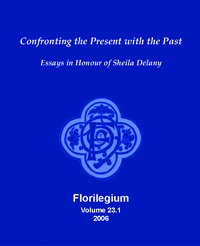Labouring to Make the Good Wife Good in the journées chrétiennes and Le Menagier de Paris
Abstract
This paper focuses on two related moments of hybridity in late medieval conduct literature concerned with the management of the conduct of the good wife's daily life. First, it examines the fusion of clerical and lay authority found in the so-called journées chrétiennes, a group of texts written by clerics to help lay people lead a contemplative life from within the married estate. Second, it considers the epistemological confusion evident in a similar attempt to navigate the interpenetration of lay and clerical experience in the opening sections of Le Menagier de Paris. It concludes that such texts make possible, through the labour of their performative reading practices, a process of textual and cultural enrichment that allows their readers to engage with the social in new ways.Downloads
Published
2006-01-01
How to Cite
Burger, G. (2006). Labouring to Make the Good Wife Good in the journées chrétiennes and Le Menagier de Paris. Florilegium, 23(1), 19–40. Retrieved from https://journals.lib.unb.ca/index.php/flor/article/view/12528
Issue
Section
Gender Studies



